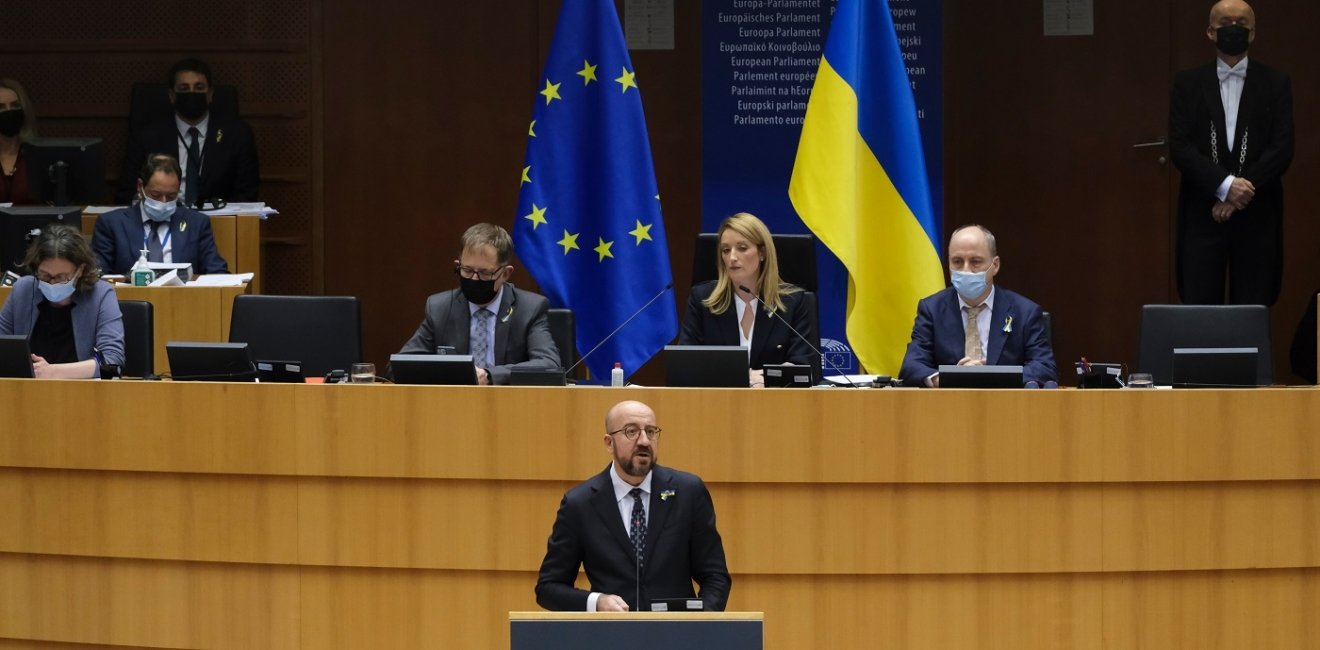
A blog of the Kennan Institute
BY MYKHAILO MINAKOV
On June 24, 2022, the EU leadership granted Ukraine candidate membership status. At the same meeting, Moldova was also granted candidate status. The accession of both to the bloc is contingent on the implementation of successful reforms.
The decision came after uneasy discussions among European politicians during the EU summit in Brussels. Under different conditions, this resolution would be an extremely hopeful and meaningful event for me personally. For many years I promoted the European choice as a strategy for Ukraine’s development toward greater freedom, stricter adherence to the rule of law, and greater social responsibility. But I find little joy in the news. Leaks from the summit deliberations indicate that the EU bestowed candidate status on Ukraine as an advance against the future for a nation at war. As a country at war, however, Ukraine needs first to vanquish the enemy, conclude hostilities, rebuild the country, and execute the reforms needed to meet the Maastricht economic convergence criteria. After that we can celebrate.
Long Path to Candidate Status
For Ukraine, EU candidate status is a well-deserved interim result on a long path to full membership. The first steps on this path were taken back in the 1990s, when Europeanization moved to the center of development strategies: a newly independent nation planned its future as a part of the European family of states.
In 2002, EU commissioner Günter Verheugen publicly announced for the first time that Ukraine indeed had “the European perspective.” This position was supported by the European Parliament in 2005. Later, Ukraine and the EU began moving closer together with respect to a free trade agreement, the Bologna Process (to ensure comparability of standards in higher education), the Eastern Partnership (a joint initiative of the EU and six post-Soviet states to promote stability and cooperation on such matters as trade, economic strategy, and travel agreements), and preparations to join the association. This effort resulted in the signing and ratification of the EU-Ukraine Association Agreement in 2014–2017.
Every step on this path was fraught with risks for Ukraine-Russia relations. Those risks were realized in Russia’s annexation of Crimea and in the start of the war in the Donbas in 2014. Yet neither the events of 2014 nor the Russian invasion in 2022 changed Ukraine’s dedication to the common European cause.
Ukraine’s candidate status won’t necessarily lead to the start of accession negotiations. But it opens up a clear set of opportunities for and obligations incumbent on the Ukrainian government in preparing for a future accession. This is one way for the EU to be sure that the candidate state respects the common values of the member states.
Opportunities for Ukraine
The opportunities for Ukraine from achieving candidate status are many, ranging from political to financial ones. I highlight two here, both critical for a nation trying to survive a war.
First, EU candidate status sets clear goals for state- and economy-building connected with the EU accession criteria (also known as the Copenhagen criteria of 1993). That means that Ukraine’s postwar reconstruction will be directed toward three targets: (1) building stable institutions guaranteeing democracy, the rule of law, human rights, and respect for and protection of minorities; (2) putting in place a functioning market economy and the capacity to cope with competition and market forces; and (3) developing the administrative capacity to implement the obligations of EU membership. With such clear goals in mind, Ukraine can proceed without the usual hesitations about development priorities, which so often stymied efforts over the past thirty years.
Second, Ukraine can now get access to funding that can help the wounded country prepare for EU accession. This funding is available through the Instrument for Pre-accession Assistance (IPA), which for 2021–2027 has a budget of over €14 billion. The funding will cover Ukraine’s efforts to put in place standards equal to those enjoyed by the citizens of the EU in respect to peace, the rule of law, a functioning democracy, and social stability, as well as a sustainable economic situation.
Ukraine’s Obligations
EU candidate status also comes with obligations. Candidate status means that Ukraine, despite the existential threat of the current war, must commit to using the opportunities afforded candidates and make an effort to develop even as the people’s hearts and minds are absorbed in defense and resistance needs.
These are some of the immediate tasks that Kyiv must address in the near future:
- Continue judicial reform to provide Ukrainian citizens with accessible justice in a reasonable time span.
- Reform the Constitutional Court to make it more effective in defending Ukraine’s constitution and citizens’ civil rights.
- Continue fighting corruption, which can be demonstrated by the appointment of a new director of the National Bank of Ukraine and a special anti-corruption prosecutor.
- Enforce and start implementing the anti-oligarch legislation, to prevent massive media and political influence.
- Accept the anti-money laundering legislation.
- Accept the media law introducing the norms of the EU audiovisual media services directive into Ukrainian legislation.
- Reform the system to protect national minorities.
How successful Ukraine is in fulfilling this first set of tasks will be indicative of the strength of the European agenda for a wartime government.
Reactions to the European Council’s Decision
The European Council’s decision has been tremendously inspiring for Ukrainians, more than 90 percent of whom support EU accession. Ukrainians’ dedication to the European choice has also prompted other Europeans—up to 65 percent—to value their own EU membership more.
Ukrainian politicians were united in their positive response to EU candidacy. President Zelensky called the decision “a victory” and “a unique and historic moment.” Former president Petro Poroshenko, one of today’s opposition leaders, supported the decision, saying that it united Ukrainians and added yet more motivation to resist Russia’s attacks. The leaders of the EU member nations also greeted Ukraine’s EU candidacy favorably.
More mixed reactions came from the leadership of Georgia (which did not receive the same status as Ukraine and Moldova) and from nations that had already received candidate status but have not yet converted to membership.
The Russian war against Ukraine has hugely narrowed Ukraine’s future. The EU summit’s decision has partly undone this limitation and has broadened the choice for Ukraine once again. Now it is up to Ukraine to make this future come to pass.
The opinions expressed in this article are those solely of the author and do not reflect the views of the Kennan Institute.
Author


Kennan Institute
After more than 50 years as a vital part of the Wilson Center legacy, the Kennan Institute has become an independent think tank. You can find the current website for the Kennan Institute at kennaninstitute.org. Please look for future announcements about partnership activities between the Wilson Center and the Kennan Institute at Wilson Center Press Room. The Kennan Institute is the premier US center for advanced research on Eurasia and the oldest and largest regional program at the Woodrow Wilson International Center for Scholars. The Kennan Institute is committed to improving American understanding of Russia, Ukraine, Central Asia, the South Caucasus, and the surrounding region through research and exchange. Read more

Explore More in Focus Ukraine
Browse Focus Ukraine
Talking to the Dead to Heal the Living

Ukrainian Issue in Polish Elections


